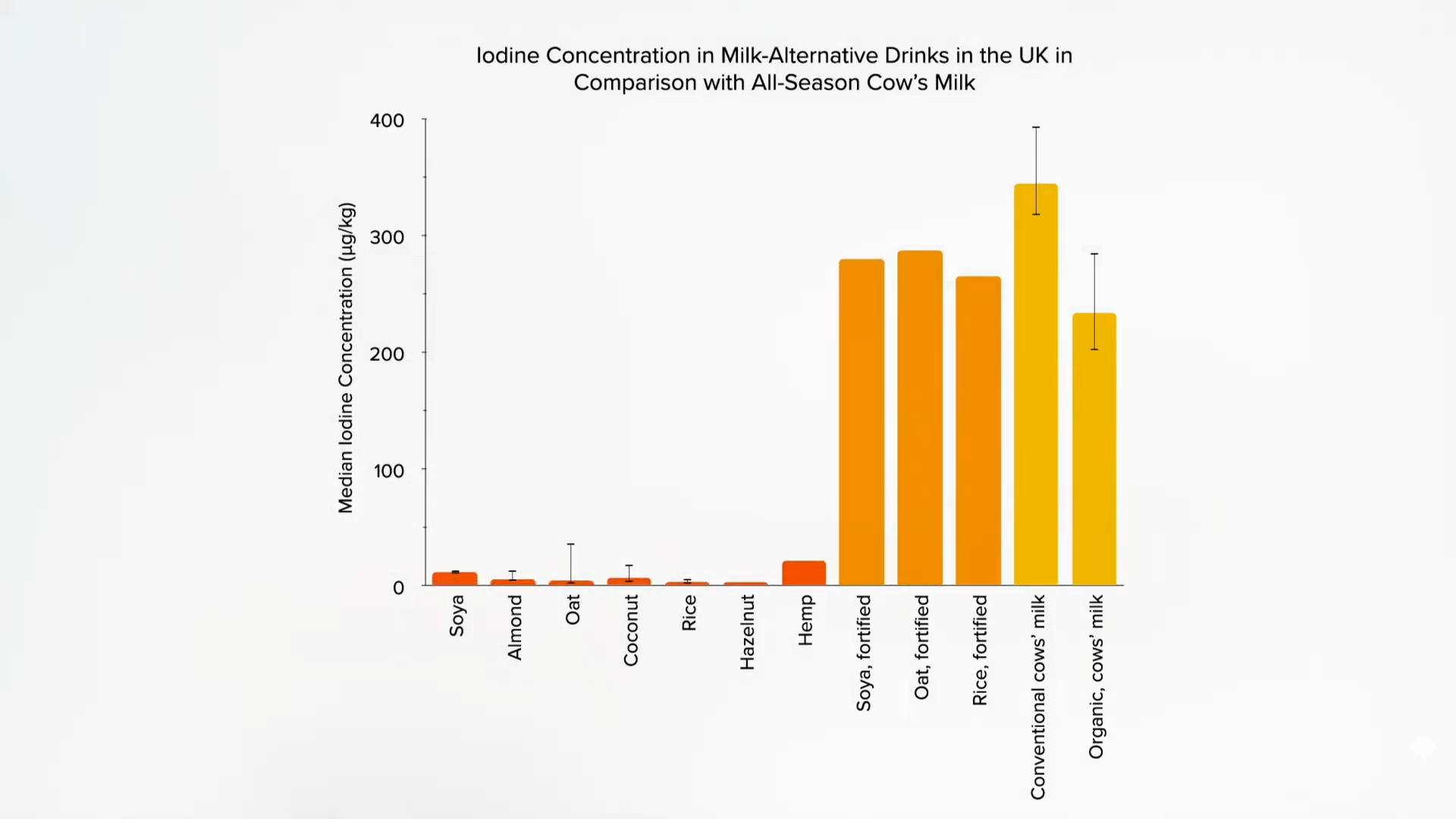Most plant-based milks are not fortified with iodine.
“Adequate dietary iodine is required for normal thyroid function.” In fact, the two thyroid hormones are named after how many iodine atoms they contain: T3 and T4. “Given that iodine is extensively stored in the thyroid gland itself, it can safely be consumed intermittently,” so we don’t need to consume it every day. However, our overall diet does need a good source of it. Unfortunately, the common sources aren’t particularly health-promoting: iodized salt and dairy foods. (Iodine-based cleansers like betadine are used on cows “to sanitize the udders, resulting in leaching of iodine in the milk.”) Iodine may also be added to cattle feed, and some commercially produced breads contain food additives with iodine.
If you put people on a paleo-type diet and cut out their dairy and table salt, they can develop an iodine deficiency, even though they double their intake of seafood, which can also be a source of iodine. What about those switching to diets centered around whole plant foods? They also cut down on ice cream and Wonder Bread, and if they aren’t eating anything from the sea, like seaweed or other sea vegetables, they can run into the same problem.
A three-year-old’s parents reported striving to feed her only the healthiest foods, and her diet included only plant-based, unsalted, and unseasoned foods. She got no unprocessed foods, but she also got no vitamin supplementation, which could be deadly. Without vitamin B12, those on strictly plant-based diets can develop irreversible nerve damage, but in this case, a goiter arose first, due to inadequate iodine intake.
In another case of “veganism as a cause of iodine-deficient hypothyroidism,” a toddler became ill after weaning. Before weaning, he was fine because his mother kept taking her prenatal vitamins, which fortunately contained iodine.
Most vegetarians and vegans are apparently unaware of the importance of iodine intake during pregnancy, “for the neurodevelopment of the unborn child, similar to their omnivorous counterparts.” The American Thyroid Association and the American Academy of Pediatrics have recommended that women, even just planning on getting pregnant, should take a daily supplement containing 150 micrograms (mcg) of iodine, yet only 60 percent of prenatal vitamins marketed in the United States contain this essential mineral. So, despite the recommendations, about 40 percent of prenatal vitamins don’t contain it. “Therefore, it is extremely important that women, especially when pregnant, breastfeeding, or planning a pregnancy, read the labels of their multivitamin supplements to ensure that they are receiving an adequate amount of iodine.”
Women of reproductive age have an average iodine level of 110 mcg/liter, which is fine for nonpregnant individuals, but we’d really like women to get at least 150 mcg/liter during pregnancy. (It’s basically a 24-hour urine test, in which iodine sufficiency is defined as 100 mcg/liter of urine in nonpregnant adults; the average vegan failed to reach this in the largest study done to date, one out of Boston.)
The recommended average daily intake is 150 mcg per day for most people, which we can get in about a cup and a half of cow’s milk. Regrettably, plant-based milks aren’t typically fortified with iodine and average only about 3 mcg per cup. Although many plant-based milks are fortified with calcium, researchers found in the largest systematic study to date that only 3 out of 47 were fortified with iodine. Those that were fortified had as much as cow’s milk, but those that weren’t fell short, as you can see at 3:30 in my video Are Vegans at Risk for Iodine Deficiency?.

Plant-based milk companies brag about enriching their milks with calcium and often vitamins B12, D, and A, but only rarely are attempts made to match iodine content. The only reason cow’s milk has so much is that producers enrich the animals’ feed or it comes dripping off their udders. So, why don’t plant-milk companies add iodine, too? I was told by a food scientist at Silk that my carrageenan video played a role in the company switching to another thickener. Hopefully, Silk will see this video, too, and consider adding iodine, or maybe another company will snatch the opportunity for a market advantage.
The researchers conclude that individuals who consume plant-based milks not fortified with iodine may be at risk for iodine deficiency, unless they consume alternative dietary iodine sources, the healthiest of which are sea vegetables, which we’ll cover next.
Doctor’s Note:
This is the first in a four-video series on thyroid function. The next three are:
For more on iodine, see the related posts below.








